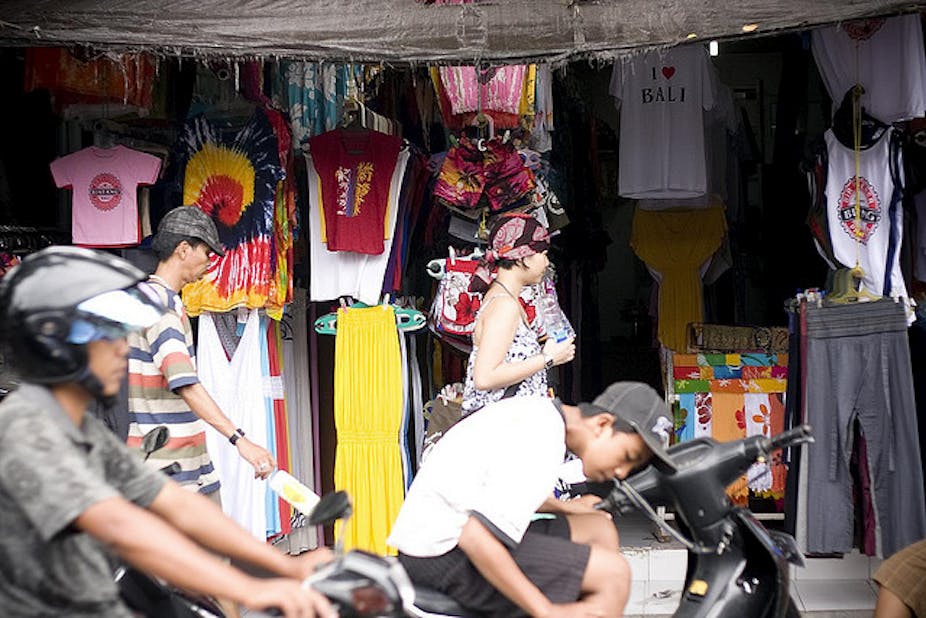Indonesia is one of Australia’s closest neighbours, but attitudes towards our southeast Asian counterparts are far from neighbourly. A recently released Department of Foreign Affairs and Trade (DFAT) report concludes that:
Indonesia is perceived as important to Australia, but knowledge about it is poor and perceptions are very mixed.
Despite the end of Suharto’s authoritarian rule in the late 1990s and our political cultures converging since Indonesia became a democracy, we haven’t seen much change in Australian public perception of Indonesia. The report showed 53% of respondents did not recognise Indonesia as a democracy.
The report also found that nearly half of Australians surveyed felt Indonesia was “a threat to Australian national security”. This is nothing new. Australians began to single out Indonesia as a “threat” during the mid-1970s when Indonesia’s military invaded East Timor.
From the 1980s, Australians have regarded Indonesia as the country most likely to threaten our national security. A 1993 survey revealed that 57% of Australians believed Indonesia could threaten Australia’s security within the next ten to 15 years.
From the Indonesian side, perceptions of Australia are perhaps more positive, in part because of the 17,000 students who come to study in Australia each year. But much more work needs to be done to ensure this improves over time.
So far, the Australian election campaign has hardly been covered in the Indonesian news, even when Indonesia is mentioned. Most reports are minimal or come from wire services or Australian-owned news services such as Radio Australia.
Indonesian president Susilo Bambang Yudhoyono (SBY) commented in Australian parliament in March 2010 that “the most persistent problem in our relations in the persistence of age-old stereotypes” and that some Indonesians believe that “Australia harbours ill-intention towards Indonesia”. ANU international relations professor Hugh White wrote earlier this year in The Monthly that despite SBY’s rather frank warning, “we have completely ignored it”.

So why is this? And how do we address Australian misconceptions of Indonesia?
In his 2001 essay Fear of the Dark: Indonesia and the Australian National Imagination, international politics lecturer Simon Philpott argued that:
…fear is an integral and inescapable element of Australia’s relations with Indonesia…The images and metaphors used to describe Indonesian society and assumption about “our” and “their” national character reflect an enduringly negative view of Indonesia.
An example of this was the recent Channel 9 television program Bali: The Dark Side of Paradise which warned that “one Australian dies every nine days”. The program raised some important issues, but according to DFAT statistics, more Australians died last year in Thailand (111), the Philippines (68), Greece (60), Vietnam (54), the United States (51), Hong Kong (40) and Germany (41) than they did in Bali (39).
We are unlikely to see a prime-time Sunday night mainstream Australian TV show about these other countries. There is something about Indonesia that generates this long-held Australian interest in its “dark side”.
The DFAT survey shows that those who have studied some aspect of Indonesian culture or language are more likely to have positive feelings toward the country. This is perhaps good evidence for putting more studies of Indonesian society (and Asia more broadly) in our school curriculum. It is also an argument to address the decline of Indonesian language and studies in universities and for pushing programs which encourage Australians to spend time in Indonesia, such as Labor’s AsiaBound Program or the Coalition’s proposed Reverse Colombo Plan.
Yet there is clearly more to this national psyche. Scholars have written that at the heart of the misperceptions and fears of Indonesia reflects how we see ourselves and our nation. We have been described as an “anxious”, “insular” and “complacent” nation.
The DFAT report shows that at the heart of the concerns of those Australians surveyed was “people smuggling through Indonesia to Australia”. This shows the current domestic political debate and subsequent media reports on asylum seekers does shape public perceptions.
As Philpott wrote in 2001:
The use of fear to win a political point in debate about Australia-Asia relations or to discipline Australian voters is far from unusual.

We’ve seen it again and again this election. Opposition leader Tony Abbott has said he will “turn back the boats”. Prime minister Kevin Rudd argued that Abbott was “trying to risk conflict” with Indonesia, then Abbott said we need more Australian Federal Police on Indonesian soil and that we should buy boats from Indonesian fishermen. It led one Indonesian politician to publicly state that Abbott himself “shows a lack of understanding and poor knowledge about the situation in Indonesia”.
So if our own political leaders have little understanding of Indonesia and play the “fear” card whenever it suits their cause, should we be surprised that Australians single out Indonesia as a threat to our national security?
This is not to say that Indonesia is without problems or that the concerns of many Australians highlighted by these surveys are completely without merit (for example, terrorism, corruption or asylum seekers dying at sea). But for too long we’ve looked at Indonesia predominately as a place to fear.
In the so-called Asian Century, it is time for a new generation of Australians to see Indonesia as a place of opportunity. An opportunity not solely to make money from its increasing economic success, but to change these age-old stereotypes by building deeper and more personal relationships with one of our nearest neighbours.

